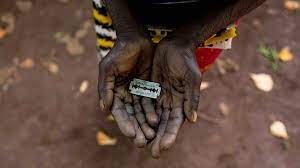Female Genital Mutilation is a cultural practice that involves the removal of a woman or girl’s external genitalia. The reason most of the time is either cultural or religious. The removal of the genitalia is either total or partial. The tribes or families that practice this always believe the act will keep the female from being promiscuous and also prepare them for marriage.
Nigeria is not out of the equation when it comes to Female Genital Mutilation as many tribes practice this act. Mostly, where FGM happens, it is always rooted in the violence against the female gender. As of 2012 according to Wikipedia, 27% of Nigerian females had undergone Female Genital Mutilation.
In May 2015, President Goodluck signed a law against this act. People who advocated for the stop of Genital cutting saw this as a significant leap in protecting the girl child in Nigeria. The practice is reported to be painful and traumatizing for every female that has to go through it. Some stand the risk of getting infected frequently, some girls lose their lives in the process. The act has too many health threats and also the loss of a girl’s sexual pleasure.
READ ALSO: The Menace Called Period Poverty In Nigeria
While this practice has significantly reduced in Nigeria and also other parts of the world, the practice is still on in some areas. Experts believe that for this act to be abolished, there would be a need for a change in culture and also mindset. The practice is often carried out by “traditional circumcisers” who are oftentimes unaware of the risk of the act.
For most families in Nigeria, because of the mindset that parents who do not hand over their girls as virgins have failed, the families see FGM as a way to keep their girls from engaging in sexual acts before marriage.

Organizations seeking to end FGC/M in Nigeria include the World Health Organization, UNICEF, the International Federation of Gynaecology and Obstetrics, African Union, Devatop Centre for Africa Development, the Economic Commission for Africa, the Coalition of Advocates against Violence and the Population Council as well as Justice, Development and Peace Movement (JDPM) of the Catholic diocese of Oyo.

